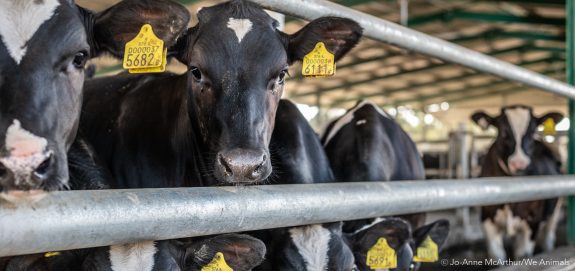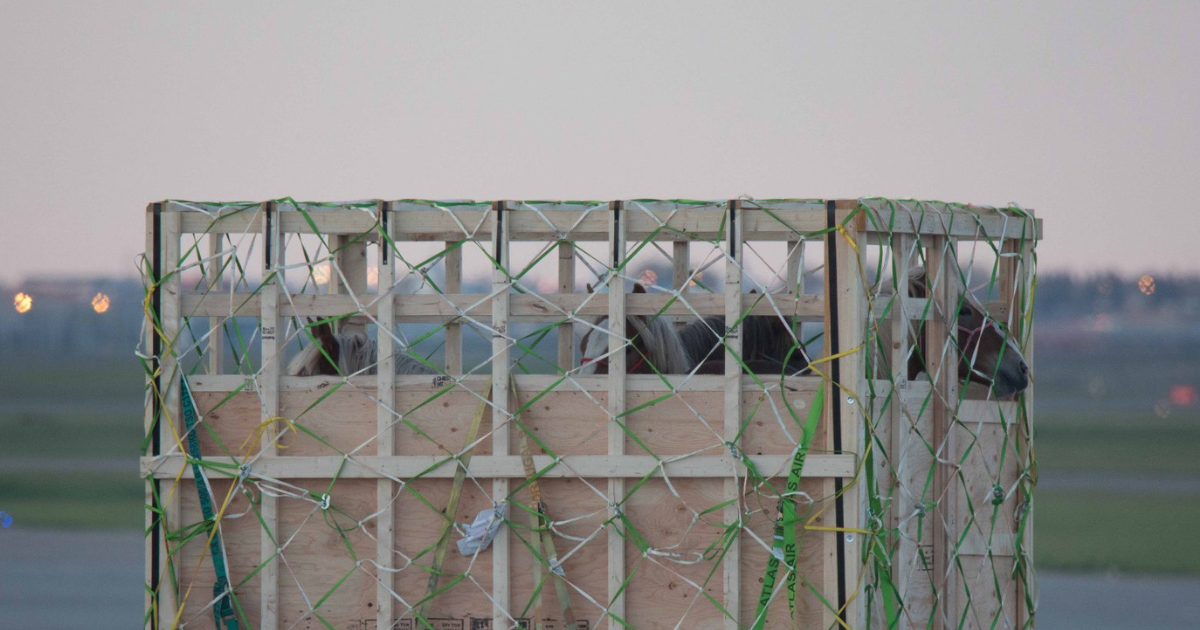As Canada’s only national animal law organization, Animal Justice regularly speaks out about animal suffering at farms and slaughterhouses. Whistleblower exposés have exposed horrific animal abuse at factory farms across the country and many standard practices – from keeping calves chained in tiny veal crates, to removing the beaks of chickens and tails of pigs without anaesthetic – cause significant pain and distress. The vast majority of the 834 million land animals killed for food in this country last year alone were raised in confinement at factory farms.
To make matters worse, because many slaughterhouses have been forced to shut down or operate at reduced capacity due to outbreaks of COVID-19 among workers, hundreds of thousands of pigs and chickens have been killed on farms across the country by means including blunt force trauma or being gassed, shot, or electrocuted, with their bodies disposed of or composted. Though rates of COVID-19 infection have declined across Canada, piglets continue to be killed on Canadian farms due to reduced market prices caused by the pandemic.
But animal cruelty is far from the only reason we believe Canada must overhaul the food system. For instance, meat and dairy production are the biggest sources of greenhouse gas emissions from the agricultural sector. Common industrialized farming practices take a heavy toll on the environment and intensive livestock operations in particular are known for using huge quantities of freshwater and causing significant air and water pollution.
Factory farms are also a ticking public health time bomb. The overuse of antibiotics at these facilities is contributing to the rise of antibiotic resistance in humans. They are also a breeding ground for new zoonotic diseases that can jump the species barrier to humans because thousands of genetically similar animals are confined indoors by the thousands in filthy, stressful conditions. Deadly strains of avian and swine flu have emerged from intensive livestock operations in the past and scientific experts agree that these facilities could be the source of the next global pandemic. Scientists are already raising the alarm about a new flu virus carried by pigs in China that has the potential to become the next global pandemic.
To protect animals, the environment, workers, and public health, Animal Justice has teamed up with a coalition of groups to urge the federal government to invest public funds strategically during the COVID-19 crisis, rather than bailing out intensive livestock operations to return to “business as usual”.
Emergency funding should promote sustainability, resilience, and compassion
So far, the Government of Canada has announced $252 million in initial emergency funding for the agricultural sector. The cow and pig farming industries alone have asked for more than $500 million in emergency funds. We believe that policy regarding the use of public funds provided should be designed to fix serious problems with Canada’s food system and supply chains, particularly in the meat industry.
Public health and economic challenges posed by the COVID-19 pandemic have shone a public spotlight on many of these problems, including unsafe and precarious working conditions, and significant corporate concentration. Canada’s meat industry in particular is controlled almost entirely by four multibillion dollar corporations: Cargill, JBS S.A., Maple Leaf, and Olymel. This extreme consolidation is a threat to our food system, as well as rural economies, and leaves supply chains vulnerable to unexpected disruptions in the future.
Public funds should be used to help those in need while also advancing objectives such as preventing the next global pandemic and putting Canada on track to a future marked by economic, social, and environmental resilience and sustainability.
Protecting people, the environment, and animals, not large corporations
Animal Justice is teaming up with the David Suzuki Foundation, Mercy For Animals, the Vancouver Humane Society, Environmental Defence, the Winnipeg Humane Society, Canadians for Ethical Treatment of Farmed Animals, Plant-Based Canada, the Canadian Coalition for Farm Animals, Evolve Our Prison Farms, Humane Society International/Canada, and Nation Rising, to urge the federal government to ensure emergency funds given to the agricultural sector are used to promote the development of a climate-compatible food system, respect for workers’ rights, animal welfare, and the transition to a resilient and sustainable food system. No public funds should be given to intensive livestock operations.
Public funds and policies should be directed, first and foremost, to farmers of climate-compatible, plant-based crops such as fruits, vegetables, mushrooms, grains, beans, nuts, and seeds, and to rebuild and grow local food systems. For instance, in June the Prime Minister announced that the federal government would invest $100 million in a Winnipeg-based facility that will be a world leader in plant-based proteins, supporting local farmers whose crops will be used by the facility.
Public funds should support independent small and mid-size farmers and communities, and not large multinational corporations. Multi-billion dollar companies do not need a public bail-out.
All workers in the agricultural sector deserve a safe working environment, including access to personal protective equipment, the ability to maintain adequate physical distancing, and paid sick leave. Some smaller companies may need government assistance to meet these basic requirements, but none of the $77.5 million in public funds already announced to retrofit and increase production at slaughterhouses and other food processors should go to multi-billion dollar companies like Cargill and JBS. These companies can and should be expected to ensure safe working conditions for their employees to prevent the spread of COVID-19 that has ravaged slaughterhouse workers across the country. In Germany, for instance, government representatives have indicated that the country’s largest pig slaughterhouse, where an outbreak of COVID-19 has infected more than 1,500 workers, will be held to account for its failure to prevent the spread of the illness and that it will not be receiving emergency support from the government.
Rebuilding local plant-based food systems
When the COVID-19 pandemic is over, one of our most important tasks as a country will be to examine our own practices and ensure that the next global pandemic does not begin within our own borders. When it comes to the agricultural sector, this will mean prioritizing the health of ecosystems and animals, and supporting farmers producing fruits, vegetables, pulses, whole grains, beans, nuts and seeds, and other climate-compatible plant-based foods, in line with Canada’s Food Guide. Emergency funding decisions should be compatible with this goal by rebuilding and growing local, safe, sustainable food systems that are more resilient and will improve food security, the health of Canadians, worker safety, and the environment on which we all depend.
Join the Animal Justice mailing list





